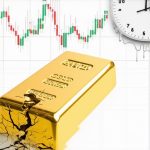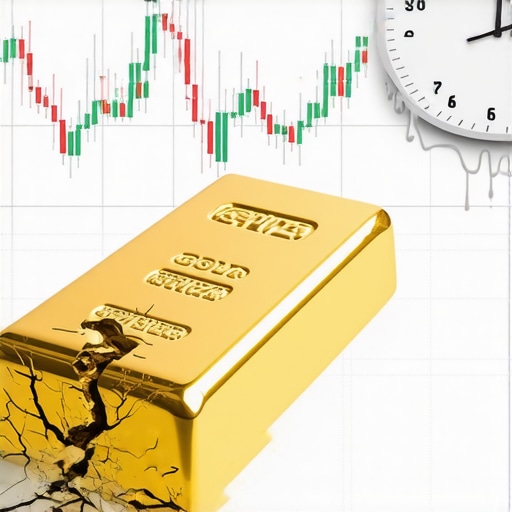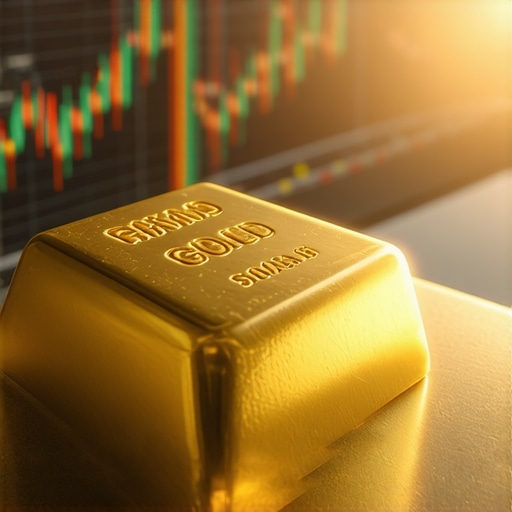Understanding Gold Price Forecasts: Key Factors Influencing the Market
As we look ahead to 2025 and beyond, the gold market remains a focal point for investors and analysts alike. The gold price forecasts are shaped by various factors, including economic conditions, geopolitical events, and shifts in investor sentiment. Understanding these elements is crucial for anyone considering investing in gold.
The demand for gold often increases during periods of economic uncertainty. Investors view gold as a safe haven asset, protecting their wealth from inflation and market volatility. For instance, during times of financial crisis, central banks may increase their gold reserves, further driving prices up. This correlation between gold and economic stability underscores the importance of gold as a hedge against economic downturns.
Global Economic Trends and Their Impact on Gold Prices
In 2025, we can expect continued fluctuations in gold prices due to global economic trends. The ongoing effects of inflation, interest rates, and fiscal policies will play significant roles. For example, if central banks maintain low interest rates to stimulate economic growth, gold may become more attractive as a non-yielding asset. Conversely, rising interest rates could lead to a decrease in gold demand, potentially lowering prices.
Moreover, geopolitical tensions can significantly affect gold prices. Events such as trade wars, military conflicts, or political instability can lead to increased investment in gold as a protective measure. Understanding these dynamics is essential when considering gold price trends.
Technological Innovations and Gold Mining
Technological advancements in gold mining and extraction processes also influence the supply side of the gold market. As mining companies adopt more efficient methods, the cost of production may decrease, allowing for greater supply. This could impact prices, particularly if demand does not keep pace with increased supply. Investors should stay informed about gold stocks and their performance to identify potential opportunities.
As we approach 2025, it’s essential to keep an eye on both macroeconomic indicators and industry-specific developments. Investors should also consider diversifying their portfolios through various gold investment vehicles, including gold ETFs and gold coins. By understanding the landscape, investors can make informed decisions about their gold investments in the years to come.
Investment Strategies for Gold in 2025
As we move into 2025, it’s essential for investors to develop effective gold investment strategies that align with market forecasts. Diversifying your portfolio through various gold investment options can help mitigate risks while maximizing potential returns. This includes exploring opportunities in both physical gold and gold-backed securities. For comprehensive guidance on this topic, check out our best gold investments for beginners.
Gold ETFs vs. Physical Gold: Making the Right Choice
When considering investments in gold, a common question arises: should you invest in gold ETFs or physical gold? Each option has its advantages and disadvantages. Gold ETFs offer liquidity and ease of trading, while physical gold provides tangible value and security. Investors should weigh these factors carefully and consider their individual investment goals. For a deeper understanding of this comparison, read our article on gold ETFs vs. mutual funds.
Top Gold Investment Trends to Watch
As we analyze the gold market, several trends are emerging that could influence prices and investment decisions in 2025. One significant trend is the increasing popularity of gold IRAs, which allow investors to hold physical gold in tax-advantaged retirement accounts. For those interested in this investment avenue, our guide on gold IRA options is invaluable.
Additionally, the rise of sustainable and ethical mining practices is gaining traction among socially conscious investors. Companies that prioritize environmental stewardship and fair labor practices may attract more attention, influencing their stock performance in the gold market. Stay informed about these developments by following our insights on gold demand trends.
Global Events and Their Influence on Gold Prices
The interplay between global events and gold price fluctuations cannot be overstated. Major geopolitical events, such as elections, trade agreements, or military interventions, can lead to rapid changes in market sentiment. Investors often flock to gold during times of uncertainty, which can drive up demand and prices. To understand the impact of such events, refer to our analysis on the impact of global events on gold prices.
The Role of Central Banks in Gold Investments
Central banks play a crucial role in the gold market. Their purchasing activities can signal confidence or concern about economic conditions. In 2024, we expect to see continued central bank buying, which may further influence gold prices. Understanding how these policies affect the market can be beneficial for investors. For an in-depth look at this subject, consider our post on how central bank policies affect gold prices.
Understanding Market Sentiment and Gold Trading
Market sentiment significantly impacts gold trading strategies. Investors should keep a close eye on sentiment indicators, such as consumer confidence and market volatility, to make informed decisions. For those interested in trading gold effectively, our guide on top strategies for successful gold trading offers practical insights and tips.
In conclusion, navigating the gold market in 2025 requires a keen understanding of various factors, including global economic trends, investment strategies, and market sentiment. By leveraging comprehensive resources and staying informed, investors can position themselves advantageously in the ever-evolving landscape of gold investments.
Understanding Gold Price Fluctuations
Gold prices are influenced by a myriad of factors, including global economic indicators, currency fluctuations, and investment trends. Investors should be aware that gold tends to perform well during economic downturns, making it a reliable asset for those looking to safeguard their wealth. For an in-depth analysis of how various elements impact gold prices, refer to our article on gold price analysis.
The Impact of Inflation on Gold Investments
Inflation is another critical factor that can affect gold prices. As the cost of living increases, many investors flock to gold as a hedge against inflation. Understanding the relationship between inflation and gold can provide valuable insights for your investment strategy. If you’re interested in this topic, read our post on using gold as a hedge against inflation.
Gold Demand Trends: Key Insights for 2024
Keeping an eye on gold demand trends is crucial for anticipating market movements. In 2024, demand is expected to rise due to various factors, such as increased interest from central banks and growing retail investment. For a comprehensive overview of these trends, explore our insights on analyzing gold demand trends.
Investing in Gold Mining Stocks: What You Need to Know
Gold mining stocks can be a lucrative addition to your investment portfolio. These stocks often reflect the performance of the underlying gold market, but they can also be influenced by operational issues and management decisions. Understanding the nuances of investing in gold mining stocks can help you make informed choices. For further details, check out our guide on why invest in gold mining stocks.
Evaluating Gold Stocks: Finding Value in 2024
With numerous gold stocks available, finding the right ones to invest in can be challenging. Investors should focus on companies with strong fundamentals, solid management, and a track record of operational success. Our article on best gold stocks for 2024 provides a valuable resource for evaluating potential investments.
Exploring Gold ETFs: Benefits and Risks
Gold ETFs offer an accessible way to invest in gold without the need to own physical assets. While ETFs can provide liquidity and diversification, they come with their own set of risks. It’s essential to understand the pros and cons of investing in gold ETFs before making your choice. For a detailed comparison of gold ETFs, visit our post on exploring gold ETFs.
Strategies for Successful Gold Trading
Successful gold trading requires a deep understanding of market dynamics and effective strategies. Investors should consider using technical analysis and staying informed about market news to enhance their trading decisions. For expert tips, refer to our guide on top strategies for successful gold trading.
In summary, navigating the gold market requires a multifaceted approach, encompassing knowledge of market trends, economic indicators, and investment strategies. By leveraging the resources available and staying informed, investors can effectively position themselves in the evolving landscape of gold investments.
Understanding Gold ETFs: How to Invest Smartly
Gold ETFs (Exchange Traded Funds) have gained popularity as an investment vehicle for those looking to gain exposure to gold without the hassle of owning physical gold. They are traded on stock exchanges like shares, providing liquidity and flexibility. However, it’s essential to understand the intricacies of investing in gold ETFs, including their structure and performance metrics. For a detailed exploration of gold ETFs, consider reading our article on exploring gold ETFs.
Benefits of Gold ETFs
Investing in gold ETFs offers several benefits, including lower costs compared to purchasing physical gold and the ability to trade easily. They also allow investors to gain exposure to gold prices without the need to store or insure physical assets. For those looking to diversify their portfolio, gold ETFs can be an excellent option. You can find more insights on gold ETFs vs mutual funds to help you make an informed decision.
Risks Associated with Gold ETFs
While gold ETFs provide an accessible way to invest, they come with risks. Market fluctuations can impact the performance of ETFs, and they may not always track the price of gold closely due to management fees and tracking errors. As a prudent investor, it’s essential to weigh these risks and consider your investment goals. For a comprehensive guide on managing risks, check out strategies to maximize returns on gold investments.
Gold Bullion vs. Gold Coins: Which is the Better Investment?
When investing in gold, one of the key decisions is whether to purchase gold bullion or gold coins. Both have their advantages and disadvantages, and understanding these can help you make the right choice for your investment strategy.
Gold Bullion: Pros and Cons
Gold bullion, typically sold in bars, offers a straightforward way to invest in gold at a lower premium over the spot price. However, they may be less liquid than coins, and some investors might find them less appealing for resale. For a deeper dive into this topic, refer to our guide on gold bullion vs. gold coins.
Gold Coins: Pros and Cons
Gold coins, on the other hand, often come with numismatic value, which can make them more appealing to collectors. They can also be easier to sell due to their recognizable form. However, they typically carry a higher premium compared to bullion. Understanding the value of different coins can enhance your investment strategy. For tips on choosing gold coins, check out how to identify the best gold coins for investment.
The Role of Gold in Economic Uncertainty
Gold has long been viewed as a safe-haven asset during times of economic uncertainty. Its value often increases when traditional markets are volatile, making it a preferred choice for risk-averse investors. Understanding why gold serves as a hedge against economic uncertainty is crucial for both new and experienced investors.
Gold as a Hedge Against Inflation
Inflation erodes purchasing power, and many look to gold as a reliable hedge. Historically, gold prices tend to rise when inflation accelerates, making it a strategic addition to your investment portfolio. For more strategies on using gold as an inflation hedge, read our focused article on using gold as a hedge against inflation.
The Impact of Global Events on Gold Prices
Global events, such as political instability, trade wars, or pandemics, can significantly impact gold prices. Investors should remain alert and informed about these events, as they can create opportunities for investment or indicate potential risks. To stay updated on how global events affect gold prices, visit our post on the impact of global events on gold prices.
Conclusion: Positioning Yourself in the Gold Market
Navigating the gold market requires a multifaceted approach that encompasses understanding price fluctuations, investment strategies, and economic indicators. Whether you choose to invest in gold ETFs, bullion, or coins, it’s essential to stay informed and adapt to market changes. Utilizing resources like gold market analysis and strategic investment insights can help you make well-informed decisions. By leveraging these tools and knowledge, investors can effectively position themselves in the evolving landscape of gold investments.
Frequently Asked Questions About Gold Investments
What are Gold ETFs and how do they work?
Gold ETFs are investment funds that are traded on stock exchanges, similar to stocks. They aim to track the price of gold and provide investors with exposure to gold without having to buy physical gold. Each share of a gold ETF represents a specific amount of gold, and investors can buy or sell shares throughout the trading day.
Are Gold Coins a good investment?
Gold coins can be a good investment, especially for those who appreciate their numismatic value. While they typically carry a higher premium than bullion, their collectibility can make them appealing. It’s essential to consider the specific coin’s market demand and historical performance when investing.
How does global economic instability affect gold prices?
Global economic instability often leads to increased demand for gold as a safe-haven asset. When traditional markets are volatile, investors flock to gold, driving up its price. Factors such as political unrest, inflation, and economic downturns can significantly impact gold prices.
What are the risks of investing in Gold ETFs?
While Gold ETFs offer convenience and liquidity, they come with risks such as market volatility and potential tracking errors. Management fees can also reduce returns. It’s vital for investors to understand these risks and monitor their investments regularly.
How can I use gold to hedge against inflation?
Gold is traditionally viewed as a hedge against inflation because its value tends to rise when inflation accelerates. By incorporating gold into your investment portfolio, you can help protect your purchasing power during inflationary periods. For more strategies, explore our resources on using gold as an inflation hedge.
What is the difference between Gold Bullion and Gold Coins?
Gold bullion refers to gold in bulk form, such as bars, and is typically sold at lower premiums over spot price than gold coins, which may have numismatic value. Gold coins can be easier to sell due to their recognizable form and appeal to collectors, but they usually come with higher premiums.
How do I choose the right gold investment for me?
Choosing the right gold investment depends on your financial goals, risk tolerance, and investment strategy. Consider factors such as liquidity, costs, and your interest in physical versus paper assets. Researching various options and consulting with a financial advisor can help you make an informed decision.
Where can I find reliable information on gold investments?
Reliable information on gold investments can be found through financial news outlets, investment research websites, and authoritative resources such as the World Gold Council. Additionally, books and articles from respected authors in finance can provide valuable insights.
What are the tax implications of investing in gold?
The tax implications of investing in gold can vary depending on your country’s tax laws. Generally, gold investments are treated as collectibles and may be subject to higher capital gains taxes. It’s advisable to consult a tax professional to understand the specific implications for your investments.
Can I invest in gold without purchasing physical gold?
Yes, you can invest in gold without purchasing physical gold through vehicles like Gold ETFs, mutual funds, or gold mining stocks. These investments provide exposure to gold prices and can be traded on stock exchanges, offering liquidity and ease of access.
Conclusion: Navigating Your Gold Investment Journey
As we delve into the intricacies of gold investments, it becomes clear that understanding various aspects—from Gold ETFs to the role of gold in economic uncertainty—can empower investors. By navigating these topics effectively, you can position yourself strategically in the gold market. Whether you opt for gold bullion, coins, or ETFs, ensuring that your decisions align with your financial goals is crucial. With the right knowledge and resources, you can harness the potential of gold as part of a diversified investment portfolio.










